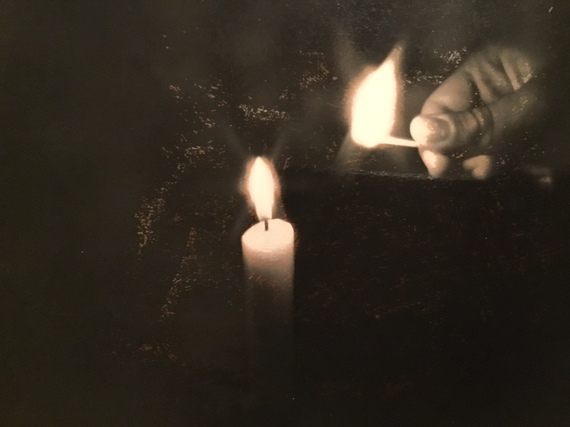I feel as though the window in which you are reading this post should be hung with black this week, and silent.
From Baton Rouge to St. Paul and Dallas, and now France, the catalogue of violence and hate and wanton desecration of the sanctity of life resounds so loudly that the impulse is to cover oneself in sackcloth and ashes and sit mute on the ground in mourning.
Throughout this year I have turned again and again to the words of Rabbi Kalonymus Kalmish Shapira of Piaseczno, the Rebbe of the Warsaw Ghetto - who, by the time he was confined to the Ghetto, had already lost most of his own family in the German bombardment of Poland and was in deep personal mourning, and yet managed to inspire and uplift those around him to the last, not least by giving eloquent articulation in his own words to their sufferings.
In his commentary on this week's Torah reading, Rabbi Shapira writes:
"Every Israelite must believe that there is nothing aside from God, not merely that there is no divinity aside from the Blessed Holy One, but that there is no reality in the world at all that is apart from God, and all the world and everything in it is a scattering of light from the Divine."
Beautiful. And how, filled with such awareness, could one ever lift a hand in violence against one's fellow refractions and reflections of God's light?
And how, one wonders, could Rabbi Shapira, filled with this faith, bear the depravity around him, the cruelty and hatred and debasement and desecration, and how could he keep trust?
In his own words this week some seventy-six years ago:
"In truth it is a perplexity, how this world remains standing at all after so very much crying. In the story of the Ten Martyrs [whom we recall on Yom Kippur], we are told that the angels cried out in outrage, 'Is this the reward of Torah?' and an echoing voice of God replied, 'Silence! If I hear one more word from you, I shall turn the entire cosmos back into primordial water.' And now, precious innocent children, pure angels themselves, not to mention the greatest and holiest sages, are murdered and slaughtered merely because they are Jews, so that the whole vault of the cosmos is full of their cries, and yet somehow the world is not turned to water but stands on its foundations as though the matter touched it not at all."
Articulacy, despair, faith, and outrage.
Our scriptures this week are full of strange fragments, references to bygone kingdoms and seeming excerpts from poetic sagas that no longer survive, except for these obscure remnants.
"Therefore it is said in the Book of the Wars of the Lord, Eth Waheb in Suphah and the Valleys of Arnon." (Numbers 21:14-15) I'd make it make more sense if I could. If you are saying, 'What?' that's the right experience.
Messages sent from Kadesh to Edom and the Canaanite king of Arad, at Arnon on the border between Moab and the Amonites, and then a song the people sing to a well at a place called Well (Be'er) -
"Spring up, O well, sing to it!
The well which the chieftains dug,
Which the nobles of the people started,
With maces, with their own staffs -
"And from Midbar to Mattanah, and from Mattanah to Nahaliel, and from Nahaliel to Bamot, and from Bamot to the valley that is in the field of Moab, the top of the peak looking out upon the wasteland." (Numbers 21:17-20)
Vanished kingdoms, unknown places. What makes us think that we can escape their common fate?
Sometimes I like to think that if Israel by contrast survived to this day as a nation it was because somehow our story filled us with the awareness that Rabbi Shapira was to articulate millennia later in the Ghetto - that everyone and everything is divine shadowplay and a scattering of light from God. I like to think that accordingly, in a world of violence, we resolved on love.
But that, too, is an imperiled and tortured reality in our times, if it is real at all.
"For God's sake," says Shakespeare's Richard II, "let us sit upon the ground and tell sad stories of the death of kings;
"How some have been deposed; some slain in war,
Some haunted by the ghosts they have deposed;
Some poison'd by their wives: some sleeping kill'd;
All murder'd: for within the hollow crown
That rounds the mortal temples of a king
Keeps Death his court and there the antic sits,
Scoffing his state and grinning at his pomp,
Allowing him a breath, a little scene,
To monarchize, be fear'd and kill with looks,
Infusing him with self and vain conceit,
As if this flesh which walls about our life,
Were brass impregnable, and humour'd thus
Comes at the last and with a little pin
Bores through his castle wall, and farewell king!"
So much for Caliphates and kingdoms, and, too, for the vainglorious promise of an America made great again (harrumph!) by way of monarchizing and conceit.
Well may one sit upon the ground and cry, our times give us ample cause. But as the world goes on standing on its foundations as though the matter touched it not at all, we learn that we must find within ourselves the secret of survival in a time run mad. Rabbi Shapira knew it well; and another scion of Eastern European Hasidism, Rabbi Abraham Joshua Heschel gave it articulation in these words:
"We either surrender to the might and threat of evil or persist in the earnestness of our existence."
So then, back to work.

